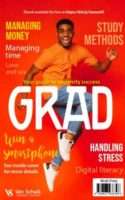A very important part of digital literacy is the ability to evaluate information. Don’t believe everything you read. Don’t fall for every conspiracy theory. Use the internet and social media intelligently. Even apparently trustworthy articles can contain wrong or misleading information. How can you tell what is trustworthy and what isn’t?
Police officers and journalists are taught the ABC: Assume nothing, Believe no one, Check everything. Do not assume an article signed by Prof. XYZ is proof of what you’re researching – check his information against at least one other article. Do not assume the person who wrote an article actually spoke to the person she’s quoting – people make things up. Do not believe the caption below a sensational picture is true and correct. Do not believe a sensational WhatsApp message just because it comes from your best mate. Check.
How do you check? A librarian at the University of California put together the CRAAP test:
Currency:
When was the article/message written? Is it still current?
Has the situation/available research changed? Should it be updated?
Relevance:
What exactly is it about?
Does it answer your specific question/need?
Authority:
Who wrote or compiled it?
Do they give their credentials?
What authority do they have?
Accuracy:
Is it true and correct?
Do they give evidence?
Can you verify it from another source or your own knowledge?
Does it sound biased?
Are there spelling and grammar mistakes?
Purpose:
Why has it been written/sent to you? To entertain? To teach? To sell something? To persuade you of a point of view?
Is it fact or opinion?
The most important moment is when you first see the information. Stop and think. Do not forward a message or quote an opinion that you have not checked.
A word on Wikipedia Wikipedia is often among the top references in answer to a search question. By all means use it; it is very often very good. The idea behind it is quite wonderful: experts in any field can and do contribute for free to create a world of information. Unfortunately, this open network also means that the information is not always reviewed or assessed and can contain mistakes. Use it as a starting point to gather information that you will then follow up. Go to the footnotes and follow the references. If you are studying, check with your lecturer before using Wikipedia as a formal reference in an academic assignment, as it is often not accepted.


